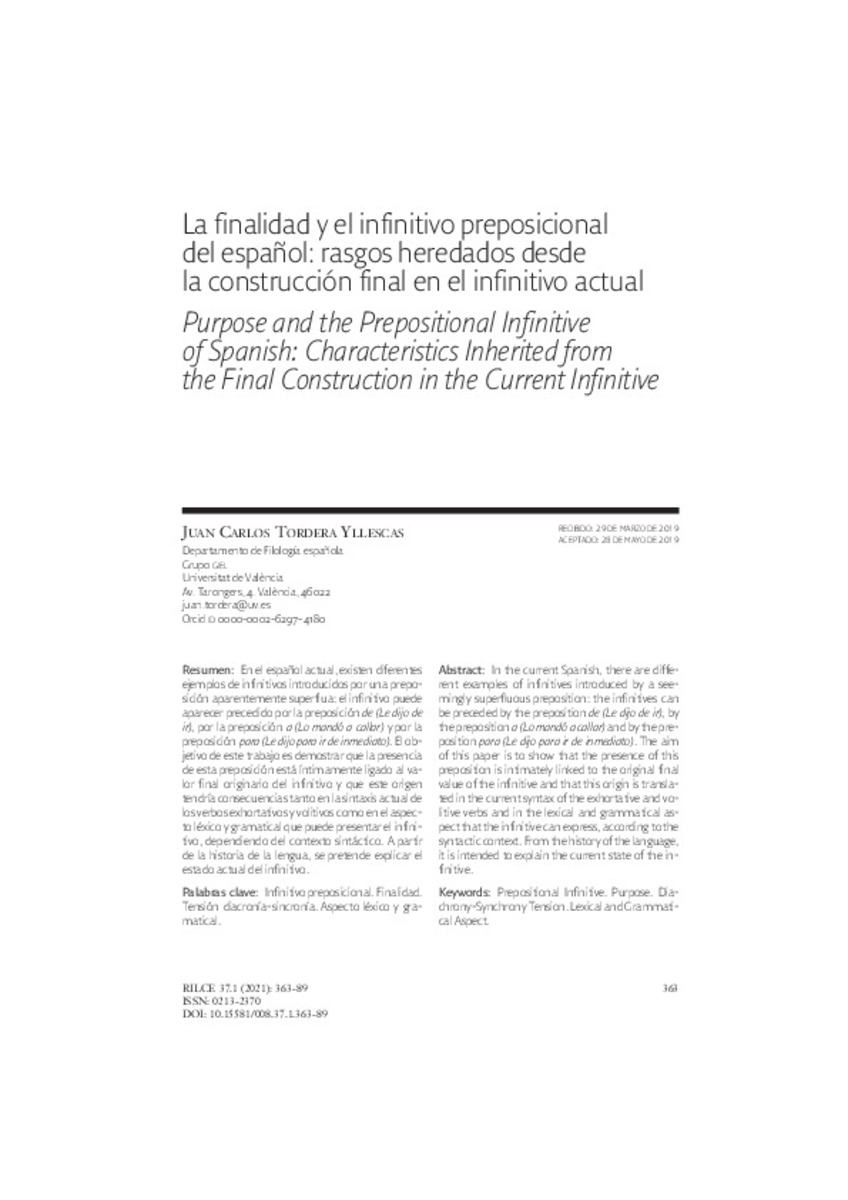Full metadata record
| DC Field | Value | Language |
|---|---|---|
| dc.creator | Tordera-Yllescas, J.C. (Juan Carlos) | - |
| dc.date.accessioned | 2020-12-21 | - |
| dc.date.accessioned | 2021-08-30T07:28:10Z | - |
| dc.date.available | 2021-08-30T07:28:10Z | - |
| dc.date.issued | 2020 | - |
| dc.identifier.citation | Tordera-Yllescas, J.C. (Juan Carlos). "La finalidad y el infinitivo preposicional del español: rasgos heredados desde la construcción final en el infinitivo actual". Rilce. Revista de Filología Hispánica. 37 (1), 2020, 363 - 89 | es |
| dc.identifier.issn | 0213-2370 | - |
| dc.identifier.uri | https://hdl.handle.net/10171/61839 | - |
| dc.description.abstract | In the current Spanish, there are different examples of infinitives introduced by a seemingly superfluous preposition: the infinitives can be preceded by the preposition <em>de (Le dijo de ir)</em>, by the preposition <em>a (Lo mandó a callar) </em>and by the preposition <em>para (Le dijo para ir de inmediato)</em>. The aim of this paper is to show that the presence of this preposition is intimately linked to the original final value of the infinitive and that this origin is translated in the current syntax of the exhortative and volitive verbs and in the lexical and grammatical aspect that the infinitive can express, according to the syntactic context. From the history of the language, it is intended to explain the current state of the infinitive. | en_US |
| dc.description.abstract | En el español actual, existen diferentes ejemplos de infinitivos introducidos por una preposición aparentemente superflua: el infinitivo puede aparecer precedido por la preposición <em>de (Le dijo de ir)</em>, por la preposición <em>a (Lo mandó a callar) </em>y por la preposición <em>para (Le dijo para ir de inmediato)</em>. El objetivo de este trabajo es demostrar que la presencia de esta preposición está íntimamente ligado al valor final originario del infinitivo y que este origen tendría consecuencias tanto en la sintaxis actual de los verbos exhortativos y volitivos como en el aspecto léxico y gramatical que puede presentar el infinitivo, dependiendo del contexto sintáctico. A partir de la historia de la lengua, se pretende explicar el estado actual del infinitivo. | es_ES |
| dc.language.iso | spa | - |
| dc.publisher | Servicio de Publicaciones de la Universidad de Navarra | es_ES |
| dc.rights | info:eu-repo/semantics/openAccess | es_ES |
| dc.subject | Infinitivo preposicional | - |
| dc.subject | Finalidad | - |
| dc.subject | Tensión diacronía-sicronía | - |
| dc.subject | Aspecto léxico y gramatical | - |
| dc.title | La finalidad y el infinitivo preposicional del español: rasgos heredados desde la construcción final en el infinitivo actual | es_ES |
| dc.title.alternative | Purpose and the Prepositional Infinitive of Spanish: Characteristics Inherited from the Final Construction in the Current Infinitive | en_US |
| dc.type | info:eu-repo/semantics/article | es_ES |
| dc.identifier.doi | 10.15581/008.37.1.363-89 | - |
| dadun.citation.endingPage | 89 | - |
| dadun.citation.number | 1 | - |
| dadun.citation.publicationName | Rilce. Revista de Filología Hispánica | - |
| dadun.citation.startingPage | 363 | - |
| dadun.citation.volume | 37 | - |
Files in This Item:
Statistics and impact
Items in Dadun are protected by copyright, with all rights reserved, unless otherwise indicated.






